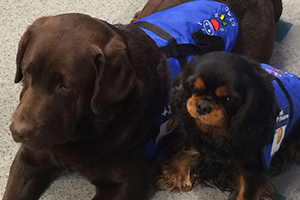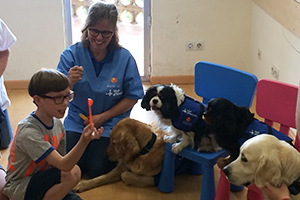null
ctac
Terapia con perros
Terapia con perros
May 22, 2018
La Fundación Probitas comienza un programa piloto con Vall d'Hebron Institut de Recerca (VHIR), Hospital Vall d'Hebron (HUVH) y el Centro de Terapias Asistidas con Perros (CTAC). El proyecto Terapia Asistida con Perros tiene la finalidad de mejorar la calidad de vida de niños y niñas con espectro autista, los pacientes infantiles con estado terminal ingresados en el Hospital Universitario Vall d'Hebron y la de los niños y niñas con el síndrome alcohólico fetal (SAF) visitados ambulatoriamente al Programa síndrome alcohólico fetal del Servicio de Psiquiatría. El SAF es un trastorno crónico causado por el consumo excesivo de alcohol durante el embarazo que puede presentar diversos síntomas como retraso de crecimiento, anomalías en los rasgos faciales, problemas cognitivos, impulsividad, falta de habilidades sociales, problemas psicomotrices y trastornos conductuales.
 El proyecto se inicia en marzo de 2018 y este primer mes servirá para sensibilizar del proyecto a todo el personal hospitalario. Se llevarán los perros al hospital para que vayan tomando contacto y esta fase de sensibilización también llegará a las familias de los beneficiarios. El mes de abril comienza el proyecto y tendrá una duración de 12 meses consecutivos, hasta que en abril del 2019 se harán públicos los resultados de este programa piloto ejecutado. La dirección terapéutica del proyecto estará a cargo del Servicio de Psiquiatría del Hospital Universitario Vall d'Hebron.
El proyecto se inicia en marzo de 2018 y este primer mes servirá para sensibilizar del proyecto a todo el personal hospitalario. Se llevarán los perros al hospital para que vayan tomando contacto y esta fase de sensibilización también llegará a las familias de los beneficiarios. El mes de abril comienza el proyecto y tendrá una duración de 12 meses consecutivos, hasta que en abril del 2019 se harán públicos los resultados de este programa piloto ejecutado. La dirección terapéutica del proyecto estará a cargo del Servicio de Psiquiatría del Hospital Universitario Vall d'Hebron.
El programa
 El proyecto se inicia en marzo de 2018 y este primer mes servirá para sensibilizar del proyecto a todo el personal hospitalario. Se llevarán los perros al hospital para que vayan tomando contacto y esta fase de sensibilización también llegará a las familias de los beneficiarios. El mes de abril comienza el proyecto y tendrá una duración de 12 meses consecutivos, hasta que en abril del 2019 se harán públicos los resultados de este programa piloto ejecutado. La dirección terapéutica del proyecto estará a cargo del Servicio de Psiquiatría del Hospital Universitario Vall d'Hebron.
El proyecto se inicia en marzo de 2018 y este primer mes servirá para sensibilizar del proyecto a todo el personal hospitalario. Se llevarán los perros al hospital para que vayan tomando contacto y esta fase de sensibilización también llegará a las familias de los beneficiarios. El mes de abril comienza el proyecto y tendrá una duración de 12 meses consecutivos, hasta que en abril del 2019 se harán públicos los resultados de este programa piloto ejecutado. La dirección terapéutica del proyecto estará a cargo del Servicio de Psiquiatría del Hospital Universitario Vall d'Hebron.El programa
El proyecto Terapia Asistida con Perros Hospital Vall d'Hebron (TAG-HUVH) se plantea como un estudio prospectivo para poder introducir los servicios de la terapia asistida con animales (TAA) en el entorno hospitalario para dar servicio a los departamentos que puedan beneficiarse de estas actividades. Los resultados del proyecto permitirán implantar de forma sostenida un programa de terapias asistidas con animales. De este modo, su puesta en marcha permitirá:
- Estudiar el impacto que tendrá la terapia asistida con perros (TAG) sobre la calidad de vida de las familias de los pacientes.
- Valorar el impacto sobre la esperanza de vida que tendrá la TAG y el nivel de complicaciones médicas que se producen a lo largo de la TAG.
- Evaluar el impacto sobre la clínica depresiva y de ansiedad, así como la calidad del sueño.
- Evaluar el impacto de la TAG en los trastornos de conducta, la atención, la clínica depresiva, ansiedad y la calidad del sueño de los pacientes con trastornos del espectro alcohólico fetal.
Actualmente, la primera fase del proyecto consta de sesiones con los perros de forma individual, con un único paciente en cada sesión (de 30 minutos aproximadamente) y dos perros. Y en la segunda fase, se inician las sesiones grupales donde participan dos perros y varios pacientes.
Los beneficiarios

Los principales beneficiarios de la prueba piloto son niños y niñas en situaciones clínicas de alta complejidad como los pacientes infantiles terminales y los trastornos del espectro alcohólico fetal, hospitalizados en las diferentes plantas del edificio materno infantil con estancia media larga. Los criterios que se han determinado para que puedan participar son:
- Pacientes infantiles con estado terminal ingresados al HUVH o niños con trastornos del espectro alcohólico fetal visitados ambulatoriamente al Programa Síndrome Alcohólico Fetal del Servicio de Psiquiatría.
- Entre los 6 y los 14 años.
- Por otra parte, los criterios de exclusión que se han fijado son:
- Presencia de patología incompatible con la visita.
- Alergia a los perros.
- Fobia a los perros.
De esta forma, se quiere llegar a unos 140 beneficiarios, pero no sólo los niños y niñas hospitalizados se beneficiarán, sino que también se quiere hacer formación a las familias. Se calcula que por cada niño que recibirá la terapia 4 familiares serán beneficiados también en el ámbito emocional.

CTAC
La entidad encargada de la preparación, gestión y ejecución de la terapia asistida con animales, explica que "el perro se convierte en un estímulo multi sensorial capaz de captar la atención y motivación del paciente o del alumno facilitando su cooperación e implicación en el proceso terapéutico o educativo". Los beneficios que destacan son:
- Trabajar la empatía
- Facilitar un canal de comunicación entre el paciente y el terapeuta
- Favorecer la socialización con el resto del grupo
- Estimulación mental y cognitiva
- Favorecer la concentración
- Facilitar el contacto físico
El proyecto no se ha hecho nunca anteriormente con niños y niñas afectados por el Síndrome Alcohólico Fetal, de ahí que se trata de un estudio innovador dentro del campo y Probitas y Vall d'Hebrón serán pioneros.
